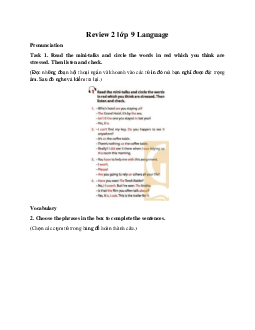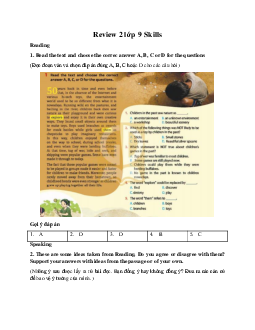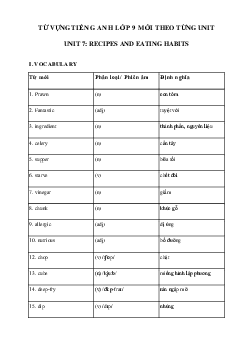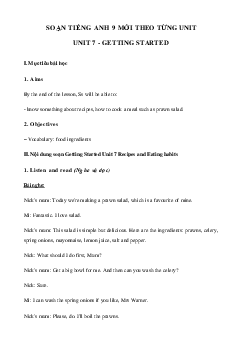




Preview text:
NGỮ PHÁP TIẾNG ANH LỚP 9 MỚI THEO TỪNG UNIT
UNIT 7: RECIPES AND EATING HABITS
1. Cách dùng mạo từ “A”
- Dùng trư ớc danh t ừ bắt đầu bằng phụ âm.
- Trước danh từ bắt đầu với “uni”. E.g: a university.
- Dùng trong các thành ng ữ chỉ số lượng nhất định.
E.g: a lot of, a couple, v.v…
- Trước “half” khi nó theo sau m ột đơn v ị nguyên v ẹn.
E.g: Note: ½ kg = half a kilo
- Dùng trư ớc “half” khi nó đi v ới một danh từ tạo thành danh t ừ ghép.
E.g: a half-holiday, a half-block, v.v…
- Dùng trư ớc các tỉ số 1/n .
E.g: a third (1/3), a quarter (1/4)
- Dùng trong các thành ng ữ chỉ giá cả, tốc độ.
E.g: two times a day, ten dollars a kilo.
- Trước danh từ số ít đếm được trong câu cảm thán. E.g: What a lovely girl!
- Đặt trư ớc Mr/Mrs/ Miss + Surname v ới ngụ ý ám ch ỉ đây là ngư ời lạ mà mình không quen biết.
E.g:a Mr Poster (người đàn ông được gọi là Poster)
2. Cách dùng mạo từ “An”
Trước một danh từ số ít bắt đầu bằng 4 nguyên âm (e, o, a, i)
Trước 2 bán nguyên âm u,y.
Trước các danh từ bắt đầu bằng âm “h” câm. E.g:an hour.
Trước các danh từ viết tắt được đọc như nguyên âm. E.g: an SOS, an MV.
3. Từ định lượng cho đồ ăn
A teaspoon of honey (một A cup of soda A tin of sardine
thìa trà (nhỏ) mật ong) (một cốc sô đa)
(một hộp, lon cá trích) A tablespoon of sugar A bottle of wine A piece of bread
(một thìa xúp (đầy) đường) (một chai rượu)
(một mẩu bánh mỳ) A carton of cookies A kilo of rice
A pot of jam ( Một hũ mứt)
(một hộp bánh quy) (một cân gạo) A slice of bread A glass of beer a leaf of lettuce
( một lát bánh mì) (một ly bia)
(một lá rau diếp) A bowl of soup A drop of oil A bag of pepper (một bát súp) (một giọt dầu)
( một túi hại tiêu) A pinch of salt A stick of sinnamon A bunnch of banana (một nhúm muối)
(một thanh/ cây quế)
(một chùm/ nải chuối) A head of cabbage A handful of cherry tomatoes A loaf of bread
(một cây bắp cải)
(một nắm cà chua bi) (một ổ bánh mì) A clove of garlic A little of water A pitcher of lemonade (một nhánh tỏi) (một ít nước)
(một bình nước chanh) 4. Some / Any
Some được sử dụng cho các danh từ số nhiều đếm được.
E.g: Some cats, Some oceans
Đôi khi some cũng được dùng cho các danh từ không đếm được: some milk.
Trong câu hỏi và câu phủ định thì dung “any” thay cho “some”. E.g: There wasn’t any milk.
Tuy nhiên, khi chúng ta muốn đề nghị hay yêu cầu một cái gì đó thì
sẽ dùng “some” thay th ế cho “any”.
E.g: Would you like some coffee?
Is there some ham in the fridge, mum? I’m very hungry.
5. Modals in the first conditional sentences.
In the first conditional sentence, we use a simple present tense in the if-clause and will
+ infinitive in the main clause. This is the standard form. Alternate forms with other
auxiliaries are also possible. Note that first conditional forms with modals express ideas
such as permission, advice, future possibilities etc.
Read the sentences given below.
Eg: If you finish your homework, you can watch TV.
If you have a few hours to spare, you may visit the museum.
If I have time, I might make a cake.
If you don’t feel well, you should consult a doctor.
Note: Many words and expressions can be used with a similar meaning to if. Common
examples are: imagine (that), suppose (that), supposing (that), providing (that), provided
(that), as long as, on condition that etc.
The words imagine, suppose and supposing are used to talk about what might happen.
Eg: Supposing you lost your job, what would you do? Imagine you won a jackpot!
Provided that, as long as and on condition that are used to make conditions. Eg:
You may take two days off on condition that you work on the weekend.
You can stay with us as long as you share the expenses.
Note : Inversion of type 1:
Câu đảo ngữ loại này được dùng để chỉ thái độ lịch sự khi đưa ra điều kiện của người
nói. Nó thường hay được dùng trong các loại văn bản giao dịch thương mại. E.g:
If anybody should phone me, please tell them I’m busy.
-> Should anybody phone me, please tell them I’m busy.
If you require any further information, do please get in touch with me personally.
-> Should you require any further information, do please get in touch with me personally.
6. Bài tập vận dụng
Write “a/ an/ some/ any” to complete the sentences
1. It seemed like _________ thousand people presented at the city square.
2. Have you got _________ first hand experiences related to this job?
3. I can see _________ golden fish in the pool. They are darting around.
4. I don’t have _________ time for myself now.
5. You can’t go out without _________ shoes.
6. I hope my teacher will provide me _________ information about internship this year. Đáp án
1. It seemed like a thousand people presented at the city square.
2. Have you got any first hand experiences related to this job?
3. I can see some golden fish in the pool. They are darting around.
4. I don’t have any time for myself now.
5. You can’t go out without any shoes.
6. I hope my teacher will provide me some information about internship this year.
Circle the correct answer
1. Mary doesn’t need (some/any) help from others as she can do it by herself.
2. There aren’t (some/any) flowers in my garden.
3. Excuse me, I need (some/any) information about the flights to Moscow next Monday.
4. We went shopping although we didn’t intend to by (some/any) clothes.
5. I wish that my teacher wouldn’t give us (some/any) homework today.
6. I’m exshausted. I want to have (some/any) time to get back my energy.
7. Do we have (some/any) money to buy a new carpet? This one is too old.
8. I don’t have any wet tissues but Jane has (some/any).
9. Yesterday the interviewer asked me (some/any) questions related to my previous job.
10. I hope that you will put (some/any) more effort in your learning. Đáp án 1. any 2. any 3. some 4. any 5. any 6. some 7. any 8. some 9. some 10. some



